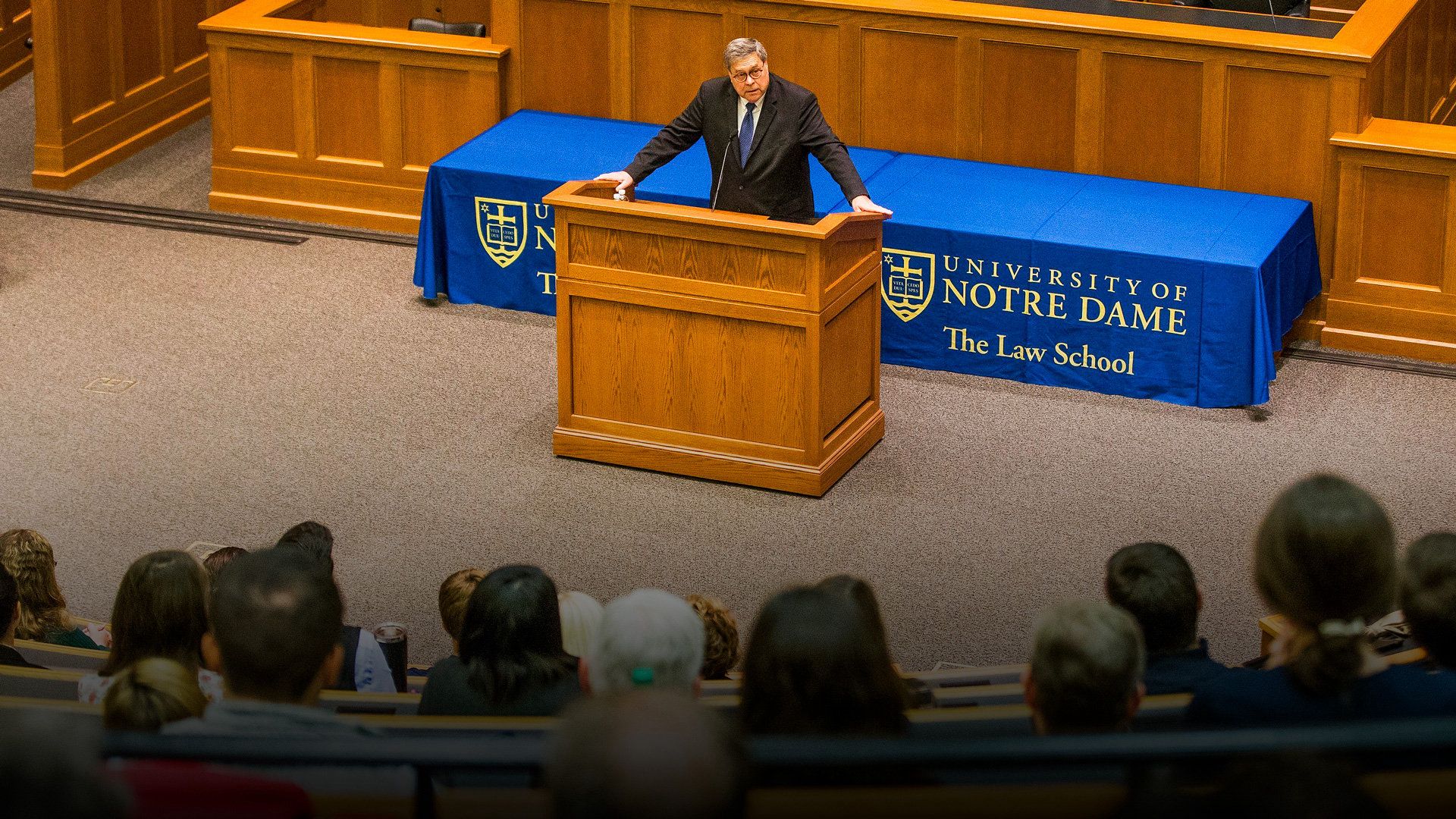
The attorney general gives a speech on secularism, and the left goes bananas.
WSJ, By William McGurn, Oct. 14, 2019 7:01 pm ET

At Notre Dame, Bill Barr Takes on the Secularists
Main Street: During a speech at Notre Dame law school on October 11, 2019, Attorney General Bill Barr explained how secularists are assaulting religious freedom in an effort to break down traditional moral values and instead impose their own orthodoxy. Image: Robert Franklin/Associated Press
For Notre Dame fans, this football weekend was a twofer. Not only did the Irish beat a longtime rival, the University of Southern California, on Saturday, the campus was treated to a sight it had never before seen: the attorney general of the United States, at a pregame tailgater, serenading faculty, students and fans with his bagpipes.
Turns out that was William Barr’s second performance on campus. The first came at the law school Friday, when he delivered a bracing speech on the role of religion in the American story of freedom.
The attorney general advanced two broad propositions. First, the waning of religion’s influence in American life has left more of her citizens vulnerable to what Tocqueville called the “soft despotism” of government dependency. Second, today’s secularists are decidedly not of the live-and-let-live variety.
“The secular project has itself become a religion, pursued with religious fervor,” he said. “It is taking on all the trappings of religion, including inquisitions and excommunication. Those who defy the creed risk a figurative burning at the stake—social, educational and professional ostracism and exclusion waged through lawsuits and savage social media campaigns.”
Right out of central casting, critics stepped forward to prove his point. New York Times columnist Paul Krugman accused Mr. Barr of “religious bigotry” and described his words as a “pogrom type speech.”
Political ethicist and professional attention seeker Richard Painter tapped out a series of even more furious tweets, here calling the speech the latest episode of “The Handmaid’s Tale,” there suggesting Mr. Barr isn’t much of a Christian, here again saying Mr. Barr sounded like “vintage Goebbels.” Over at MSNBC, meanwhile, retired Army Col. Lawrence Wilkerson, once chief of staff to Secretary of State Colin Powell, told Joy Reid the attorney general is “Torquemada in a business suit,” a reference to the Spanish Inquisition’s grand inquisitor.
This is what we have come to expect when someone in public life mentions religion in a positive light. Many didn’t like Mr. Barr’s blaming secularism for social pathologies such as drug addiction, family breakdown and increasing numbers of angry and alienated young males. Yet few engaged his more arresting contention, which is that all these problems have spiritual roots. Whereas religion addresses such challenges by stressing personal responsibility, Mr. Barr argued, the state’s answer is merely to try to alleviate “bad consequences.”
“So the reaction to growing illegitimacy is not sexual responsibility, but abortion,” he said. “The reaction to drug addiction is safe injection sites. The solution to the breakdown of the family is for the state to set itself up as an ersatz husband for the single mother and an ersatz father for the children. The call comes for more and more social programs to deal with this wreckage—and while we think we’re solving problems, we are underwriting them.”
Vincent Phillip Muñoz, a Notre Dame professor, notes there was nothing particularly Catholic about this speech. Like Washington in his Farewell Address, he says, Mr. Barr focused on the irreplaceable role of religion in cultivating the morality citizens need to be capable of self-government.
“The speech wasn’t first and foremost about religious freedom,” says Mr. Muñoz. “It was about the human and social consequences of the new secular morality, and what happens when the state views its citizens not only in purely material terms, but as subjects who can’t really govern themselves.”
Even those who strongly disagree with Mr. Barr ought to have found this an invitation for thoughtful and vigorous debate. But rather than engage, some imply there is something unseemly about an attorney general’s even speaking at a Catholic university. Given the hostility that holding such a conversation engenders on campuses today, perhaps America can count itself fortunate it still has a university where this can happen.
Carter Snead, the law professor who invited Mr. Barr, puts it this way: “At Notre Dame, we are not afraid to explore the hard questions about God, religion and America together in friendship, especially on those matters about which people strongly disagree.”
Mr. Barr’s argument has been echoed throughout American history: “Our Constitution was made only for a moral and religious people” (John Adams). “Liberty cannot be established without morality, nor morality without faith” (Tocqueville). “In teaching this democratic faith to American children, we need the sustaining, buttressing aid of those great ethical religious teachings which are the heritage of our modern civilization. For ‘not upon strength nor upon power, but upon the spirit of God’ shall our democracy be founded” (FDR). And so on.
That so many would become unhinged by Mr. Barr’s relatively modest contribution to the genre is highly revealing of the absolutism of secularist opponents determined to marginalize and destroy anyone who dares dissent from their own uncompromising orthodoxy.
Write to mcgurn@wsj.com.
Copyright ©2019 Dow Jones & Company, Inc. All Rights Reserved. 87990cbe856818d5eddac44c7b1cdeb8
